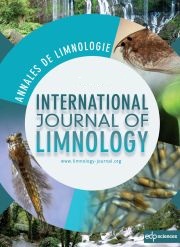Crossref Citations
This article has been cited by the following publications. This list is generated based on data provided by
Crossref.
Martí, Eugènia
Riera, Joan Lluís
and
Sabater, Francesc
2009.
Water Scarcity in the Mediterranean.
Vol. 8,
Issue. ,
p.
173.
von Schiller, D.
Martí, E.
and
Riera, J. L.
2009.
Nitrate retention and removal in Mediterranean streams bordered by contrasting land uses: a <sup>15</sup>N tracer study.
Biogeosciences,
Vol. 6,
Issue. 2,
p.
181.
Marcé, R.
and
Armengol, J.
2009.
Modeling nutrient in-stream processes at the watershed scale using Nutrient Spiralling metrics.
Hydrology and Earth System Sciences,
Vol. 13,
Issue. 7,
p.
953.
Grantham, Theodore E.
Cañedo-Argüelles, Miguel
Perrée, Isabelle
Rieradevall, Maria
and
Prat, Narcís
2012.
A mesocosm approach for detecting stream invertebrate community responses to treated wastewater effluent.
Environmental Pollution,
Vol. 160,
Issue. ,
p.
95.
Mußmann, Marc
Ribot, Miquel
von Schiller, Daniel
Merbt, Stephanie N.
Augspurger, Clemens
Karwautz, Clemens
Winkel, Matthias
Battin, Tom J.
Martí, Eugènia
and
Daims, Holger
2013.
Colonization of freshwater biofilms by nitrifying bacteria from activated sludge.
FEMS Microbiology Ecology,
Vol. 85,
Issue. 1,
p.
104.
Englert, Dominic
Zubrod, Jochen P.
Schulz, Ralf
and
Bundschuh, Mirco
2013.
Effects of municipal wastewater on aquatic ecosystem structure and function in the receiving stream.
Science of The Total Environment,
Vol. 454-455,
Issue. ,
p.
401.
Vilmin, Lauriane
Flipo, Nicolas
Escoffier, Nicolas
Rocher, Vincent
and
Groleau, Alexis
2016.
Carbon fate in a large temperate human‐impacted river system: Focus on benthic dynamics.
Global Biogeochemical Cycles,
Vol. 30,
Issue. 7,
p.
1086.
Yao, Jingmei
Colas, Fanny
Solimini, Angelo G.
Battin, Tom J.
Gafny, Sarig
Morais, Manuela
Puig, María Á.
Martí, Eugenia
Pusch, Martin T.
Voreadou, Catherina
Sabater, Francesc
Julien, Frédéric
Sánchez‐Pérez, José M.
Sauvage, Sabine
Vervier, Philippe
and
Gerino, Magali
2017.
Macroinvertebrate community traits and nitrate removal in stream sediments.
Freshwater Biology,
Vol. 62,
Issue. 5,
p.
929.
Huang, Jingshui
Yin, Hailong
Chapra, Steven
and
Zhou, Qi
2017.
Modelling Dissolved Oxygen Depression in an Urban River in China.
Water,
Vol. 9,
Issue. 7,
p.
520.
Rodríguez-Castillo, Tamara
Barquín, José
Álvarez-Cabria, Mario
Peñas, Francisco J.
and
Álvarez, César
2017.
Effects of sewage effluents and seasonal changes on the metabolism of three Atlantic rivers.
Science of The Total Environment,
Vol. 599-600,
Issue. ,
p.
1108.
Sánchez-Morales, Marc
Sabater, Francesc
and
Muñoz, Isabel
2018.
Effects of urban wastewater on hyporheic habitat and invertebrates in Mediterranean streams.
Science of The Total Environment,
Vol. 642,
Issue. ,
p.
937.
Wang, Chao
Li, Zhenhuan
Cao, Lei
and
Cheng, Bowen
2018.
A Superhydrophilic and Anti-Biofouling Polyphenylene Sulfide Microporous Membrane with Quaternary Ammonium Salts.
Macromolecular Research,
Vol. 26,
Issue. 9,
p.
800.
Ribot, Miquel
Cochero, Joaquín
Vaessen, Timothy N.
Bernal, Susana
Bastias, Elliot
Gacia, Esperança
Sorolla, Albert
Sabater, Francesc
and
Martí, Eugènia
2019.
Leachates from Helophyte Leaf-Litter Enhance Nitrogen Removal from Wastewater Treatment Plant Effluents.
Environmental Science & Technology,
Vol. 53,
Issue. 13,
p.
7613.
Nega, Marcella
Braun, Burga
Künzel, Sven
and
Szewzyk, Ulrich
2019.
Evaluating the Impact of Wastewater Effluent on Microbial Communities in the Panke, an Urban River.
Water,
Vol. 11,
Issue. 5,
p.
888.
Calabrese, Silvia
Mezzanotte, Valeria
Marazzi, Francesca
Canobbio, Sergio
and
Fornaroli, Riccardo
2020.
The influence of multiple stressors on macroinvertebrate communities and ecosystem attributes in Northern Italy pre-Alpine rivers and streams.
Ecological Indicators,
Vol. 115,
Issue. ,
p.
106408.
Eryiğit, Miraç
Evrendilek, Fatih
and
Karakaya, Nusret
2020.
Quantifying spatiotemporal rhythm of stream metabolism along human disturbance gradients.
Annales de Limnologie - International Journal of Limnology,
Vol. 56,
Issue. ,
p.
16.
Ochieng, Hannington
Odong, Robinson
and
Okot-Okumu, James
2020.
Comparison of temperate and tropical versions of Biological Monitoring Working Party (BMWP) index for assessing water quality of River Aturukuku in Eastern Uganda.
Global Ecology and Conservation,
Vol. 23,
Issue. ,
p.
e01183.
Bernal, Susana
Drummond, Jennifer
Castelar, Sara
Gacia, Esperança
Ribot, Miquel
and
Martí, Eugènia
2020.
Wastewater treatment plant effluent inputs induce large biogeochemical changes during low flows in an intermittent stream but small changes in day-night patterns.
Science of The Total Environment,
Vol. 714,
Issue. ,
p.
136733.
Calapez, Ana R.
Elias, Carmen L.
Alves, Artur
Almeida, Salomé F.P.
Brito, António G.
and
Feio, Maria João
2020.
Shifts in biofilms’ composition induced by flow stagnation, sewage contamination and grazing.
Ecological Indicators,
Vol. 111,
Issue. ,
p.
106006.
Zhang, Lei
Zhou, Yi
Cheng, Yu
Lu, Wenxuan
and
Liang, Yangyang
2021.
Effect of different types of industrial wastewater on the bacterial community of urban rivers.
Journal of Freshwater Ecology,
Vol. 36,
Issue. 1,
p.
31.


